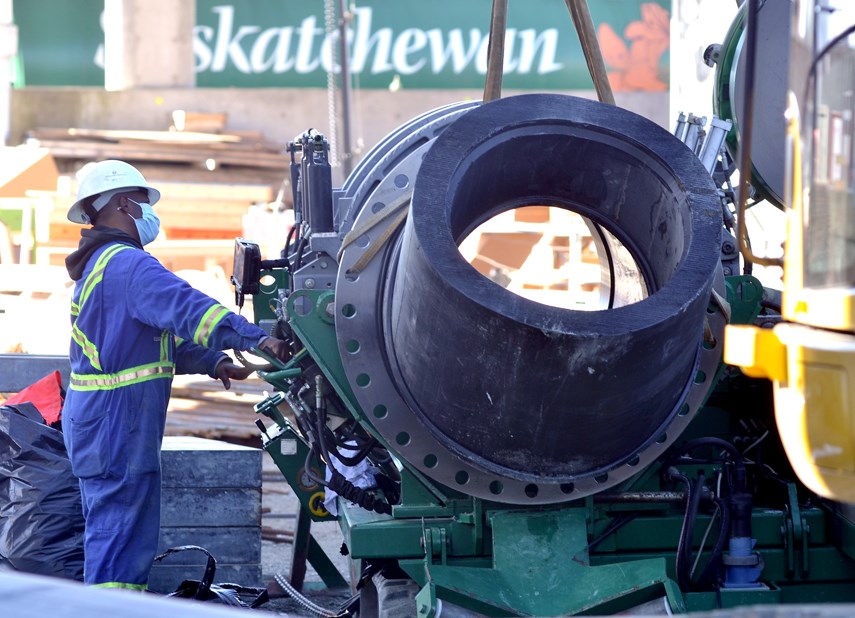When it can catch its breath, providing it does not take much time to do so, the newly minted David Eby government has some serious thinking to do about the North Shore Wastewater Treatment Plant.
And either now or quite soon, it also ought to consider how its thin election mandate sent a signal about public finances, then consider the structure of regional governance by Metro Vancouver.
The most imminent issue is the sprawling budget for the plant, which has metastasized from an original $550 million contract to initial builder Acciona into a $3.86 billion plan (for now, anyway) to Aeron and PCL to design and construct an admittedly larger-in-scope project.
There are other costs to consider: the decommissioning and remediation of the existing Lions Gate Treatment Plant, the ongoing operational and maintenance costs, any possible soil remediation, any possible legal settlements with Acciona, and any possible inflation and market variances ahead. Let’s set those aside, though, for the more urgent matters at hand.
First and foremost, it is vital that a deep dive is conducted into how this went the way it did. There is a palpable skepticism publicly and politically about how costs crept without clear communication to those who will pay for it, and to date the shape of any review of the pathology of the mess is inadequate to the task of satisfying the need for public accountability. It is true that the District of North Vancouver in recent days has called on the province to conduct a full-fledged inquiry, a powerful vehicle that would put feet to the fire. It is an open question, though, if that’s where this is going.
While the BC Conservatives wanted a thorough inquiry, Eby, both before the election and during the campaign, was less than encouraging about whether he wanted to overtake what Metro Vancouver has so far indicated will be a much more limited review.
Who can blame the premier? An inquiry without serious guardrails could, after all, recommend that the province take back the duties of Metro Vancouver if it wants to ensure proper scrutiny of the sizable infrastructure projects under its wing. The Eby government has wisely winced at that suggestion.
Eby also has to decide if the province is going to chip in with some cash to mitigate taxpayer pain for Metro Vancouver, and particularly the North Shore (the latter looking at bills of at least $590 annually for three decades). If it is a political axiom that there is only one taxpayer, it would be nice if in this case it was at least the full body of individual taxpayers in on it – but I suspect that’s magical thinking.
On Eby’s docket, too, is the suggestion by West Vancouver Mayor Mark Sager that the costs be considered a property tax levy, permitting their deferral by the province in exchange for the low-interest loans qualified owners now can claim until the sale of a home. While it is a clever dodge of a hefty bill, like other decisions associated with this plant it could be a possible precedent for the province for the eventual $10-billion Iona Island plant coming before terribly long. (On the other hand, the difference is that there is considerable federal and provincial money in that project.)
Not to be dismissed are the debt servicing costs Metro Vancouver is bearing as a percentage of the revenue it receives. The most recent data indicates the costs have reached 20 per cent and will grow in the years ahead as Metro faces the imposition of double-digit increases for the roughly 300 projects it oversees. One expert wrote to say that the 40-per-cent cap on debt servicing costs will be difficult to meet once the Iona plant is onstream. It’ll take a board decision to take that cap off, and by that time our public finances at a municipal, regional, provincial and federal level will be a shambles.
We are already operating in an uncompetitive tax climate compared to our southern neighbours – bound to be more so in the next four years – and while it’s a nice idea to defer or mitigate the worst of the pain, few of our leaders want to level with us that the better idea is to help us live within our means.
Kirk LaPointe is a West Vancouver columnist with an extensive background in journalism. His column runs biweekly in the North Shore News.




